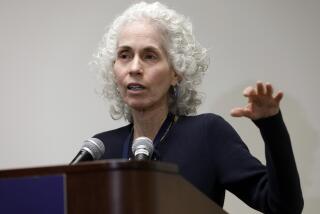Agencies Serving Public Told to Offer Interpreters
In an action affecting Los Angeles more than any other city in the country, federal authorities on Wednesday issued a directive to health care and social services providers receiving federal funds that they must offer free interpreters to clients whose English is limited and post notices telling them they are entitled to such assistance.
“This guidance enhances our ability to reach our national goal of eliminating racial and ethnic disparities in health,” said Health and Human Services Secretary Donna E. Shalala.
Advocates for low-income immigrants in Los Angeles hailed the document, called a “guidance,” as an important “first step” in providing “meaningful access” to millions of limited-English speakers who depend on their minor children, friends and even strangers to communicate with doctors and hospital personnel.
“It sends a strong message,” said Doreena Wong, a staff attorney at the National Health Law Program, a health policy group based in Los Angeles.
Notices about language assistance are to be posted in lobbies and waiting areas in several languages, informing clients of their right to free interpreter services.
Intake workers at affected agencies are to identify the primary language or languages of their clients and note them in patient files.
The new guidelines also require interpreters to be trained and competent.
In Los Angeles, where 40% of the population is foreign-born and more than 100 languages are spoken, offering competent language assistance will be a challenge, say health care advocates and providers.
In the 1990 census, 50% of Latinos were identified as having limited English proficiency. Among newer Asian immigrants, more than 60% said they had limited English proficiency.
Existing laws already require health care and social service agencies that receive federal grants to provide competent language assistance, but many are not in compliance or handle the issue inappropriately, Wong and others said at Wednesday’s news conference at the Asian Pacific American Legal Center.
For example, a 52-year-old Korean-speaking woman who went for a gynecological examination at a county-run facility ended up having a 16-year-old boy interpret for her, said Yolanda Vera, staff attorney for the Western Center for Law and Poverty.
“There was no interpreter available for her, so one of the staffers went out to the waiting area and asked if anyone spoke Korean,” said Chen Lin, program coordinator at Pacific Asian Language Services.
A Korean family happened to be there with a 16-year-old boy, so they got him to interpret, Lin said.
At another county-run facility a Vietnamese mother seeking care for her child was told that she had to get her own interpreter, Lin said. So the woman dashed outside and frantically stopped people with Asian faces and asked if they spoke Vietnamese.
Unfortunately, Lin said, cases like those are all too common.
Efrain G. Fuentes, director of patient and family services at Childrens Hospital Los Angeles, said his facility is considered a leader in providing language assistance to its patients.
But even there, it’s hard to be prepared for every contingency, he said.
Two months ago, a Spanish-speaking interpreter encountered a patient who spoke Kanjobal, a Mayan dialect, he said.
Through much effort and community outreach, the hospital was able to locate a person who spoke Kanjobal, but only to learn that he did not speak English, he said.
Such is the challenge in polyglot Los Angeles, Fuentes said.
Under the new procedures, health care providers that suggest or encourage clients with limited English to use friends or minor children as interpreters could expose themselves to liability and ultimately risk losing federal funding.
More to Read
Sign up for Essential California
The most important California stories and recommendations in your inbox every morning.
You may occasionally receive promotional content from the Los Angeles Times.










